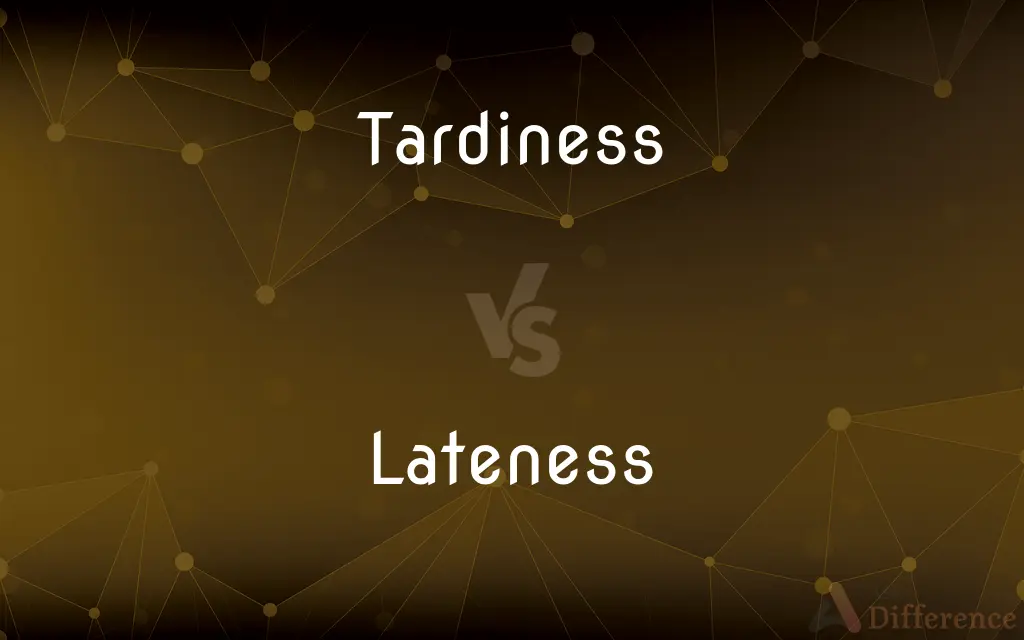Tardiness vs. Lateness — What's the Difference?
By Maham Liaqat & Fiza Rafique — Updated on March 22, 2024
Tardiness implies habitual or chronic delay, often with a negative connotation, while lateness can simply denote being behind schedule, without habitual implications.

Difference Between Tardiness and Lateness
Table of Contents
ADVERTISEMENT
Key Differences
Tardiness often carries a sense of habitual delay and a negative connotation, suggesting a pattern of being late. Whereas lateness can refer to a single occurrence of not being on time, without implying a habit or character flaw.
Tardiness is frequently used in formal contexts like workplaces or schools, highlighting the seriousness of repeated delays. On the other hand, lateness is more versatile and can be used in both casual and formal situations without necessarily implying negligence or disrespect.
In terms of implications, tardiness can impact one's reputation, being viewed as a sign of unreliability or disrespect. Whereas lateness might be seen as less severe, often attributed to unforeseen circumstances rather than personal traits.
Tardiness often requires accountability and may lead to consequences in structured environments. In contrast, lateness, depending on the context and frequency, might be met with more understanding and fewer repercussions.
Both terms serve as reminders of the importance of time management, but the use of "tardiness" can underline the need for improvement more strongly than "lateness".
ADVERTISEMENT
Comparison Chart
Connotation
Often negative, implying habitual delay
Neutral, indicating a single instance of delay
Usage Context
More formal, like in workplaces or schools
Both formal and informal contexts
Implications
Can suggest unreliability or disrespect
Generally seen as less severe
Frequency
Implies repeated occurrences
Can refer to a one-time event
Impact on Image
May negatively affect one’s reputation
Less likely to have a long-term impact
Compare with Definitions
Tardiness
Commonly used in formal situations.
The school's policy on tardiness is strict.
Lateness
Lateness can refer to being late on a particular occasion.
His lateness was due to traffic.
Tardiness
Tardiness refers to the habit of being late.
His tardiness to meetings frustrated his team.
Lateness
Applies in both casual and formal settings.
Apologies for my lateness, I was caught in the rain.
Tardiness
It often carries a negative implication.
Tardiness is frowned upon in professional settings.
Lateness
Often met with more leniency.
The professor was understanding about students' lateness due to the storm.
Tardiness
Can impact one's image negatively.
Constant tardiness might lead to a poor evaluation.
Lateness
Generally does not imply habitual behavior.
Her lateness was out of character and excused.
Tardiness
Often leads to consequences.
Tardiness resulted in a written warning from her supervisor.
Lateness
Usually seen as less critical.
The lateness of the delivery was due to unforeseen delays.
Tardiness
Tardiness is the habit of being late or delaying arrival. Being late as a form of misconduct may be formally punishable in various arrangements, such as workplace, school, etc.
Lateness
Coming, occurring, continuing, or remaining after the correct, usual, or expected time; delayed
A late breakfast.
A late meeting.
Tardiness
Occurring, arriving, acting, or done after the scheduled, expected, or usual time; late.
Lateness
Occurring at an advanced hour, especially well into the evening or night
A late movie on television.
The late flight to Denver.
Tardiness
Moving or progressing slowly; sluggish
Walking at a tardy pace.
Lateness
Of or toward the end or more advanced part, as of a period or stage
The late 19th century.
A later symptom of the disease.
Tardiness
(uncountable) The state or quality of being tardy.
Lateness
Having begun or occurred just previous to the present time; recent
A late development.
Tardiness
(countable) The result or product of being tardy.
Lateness
Contemporary; up-to-date
The latest fashion.
Tardiness
The quality or state of being tardy.
Lateness
Having recently occupied a position or place
The company's late president gave the address.
Tardiness
The quality or habit of not adhering to a correct or usual or expected time
Lateness
Dead, especially if only recently deceased
In memory of the late explorer.
Lateness
After the expected, usual, or proper time
A train that arrived late.
Woke late and had to skip breakfast.
Lateness
At or until an advanced hour
Talked late into the evening.
Lateness
At or into an advanced period or stage
A project undertaken late in her career.
Lateness
Recently
As late as last week he was still in town.
Lateness
The property of being late.
His chronic lateness will cost him a promotion if not his job.
Lateness
The state, condition, or quality, of being late; as, the lateness of his arrival; the lateness of the hour; the lateness of the season.
Lateness
Quality of coming late or later in time
Common Curiosities
How do schools typically handle tardiness?
Schools often have strict policies for tardiness, emphasizing the importance of punctuality.
What is the main difference between tardiness and lateness?
Tardiness implies a habit of being late with a negative connotation, while lateness refers to a single instance of delay.
Is lateness always viewed negatively?
Lateness is generally seen as less severe and can be attributed to unforeseen circumstances.
Can a single instance of being late be considered tardiness?
No, tardiness usually refers to a pattern of being late, not a single occurrence.
Can tardiness lead to disciplinary actions in the workplace?
Yes, repeated tardiness can lead to disciplinary actions in many workplaces.
Do both tardiness and lateness have the same implications in all contexts?
No, the implications can vary depending on the context and the frequency of occurrences.
Is it acceptable to use 'lateness' in formal communications?
Yes, 'lateness' can be used in both formal and informal communications, but the choice of word may depend on the context.
Can tardiness affect one's professional reputation?
Yes, habitual tardiness can negatively impact one's reputation in professional settings.
Does tardiness affect all age groups similarly?
Tardiness can affect all age groups, but the implications and responses may vary depending on the context.
Is it possible to change from being habitually tardy to punctual?
Yes, with conscious effort and changes in habits, it's possible to overcome tardiness and become more punctual.
Are there any positive connotations associated with tardiness?
Tardiness is generally viewed negatively and is not associated with positive connotations.
Can cultural differences influence perceptions of tardiness and lateness?
Yes, cultural norms and values can significantly influence how tardiness and lateness are perceived and addressed.
How can one improve tardiness?
Improving time management skills and planning ahead can help reduce tardiness.
Is being occasionally late the same as tardiness?
No, occasional lateness does not constitute tardiness, which implies habitual delay.
Can lateness be excused in certain situations?
Yes, lateness can often be excused, especially if it's due to unforeseen circumstances.
Share Your Discovery

Previous Comparison
Exam vs. Examination
Next Comparison
Explanation vs. AnalysisAuthor Spotlight
Written by
Maham LiaqatCo-written by
Fiza RafiqueFiza Rafique is a skilled content writer at AskDifference.com, where she meticulously refines and enhances written pieces. Drawing from her vast editorial expertise, Fiza ensures clarity, accuracy, and precision in every article. Passionate about language, she continually seeks to elevate the quality of content for readers worldwide.














































